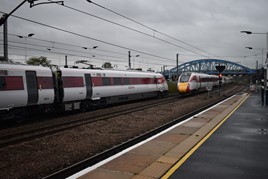The introduction of new trains, combined with the withdrawal of many older vehicles such as High Speed Trains, Mk 3s and Pacers, has lowered the average age of Britain’s passenger train fleets.
The average age of franchised operator fleets (as at March 2020) has decreased by 1.9 years to 17.3 years old, while non-franchised operator fleets have decreased by 0.1 years to 19.2 years, according to new data released by the Office of Rail and Road.
And it’s expected that the average age of the UK’s passenger trains will drop to 15 years by March 2021. This is because an extra 1,565 vehicles ordered during 2017-18 are now being introduced, meaning that the total number of new vehicles expected to be delivered between 2014 and 2021 will have reached almost 7,200 (more than half of the current fleet).
Changes in the average age of rolling stock are recorded against the same time period the previous year, and a vehicle drops out of the dataset once it’s no longer leased by an operator.
Because all existing rolling stock ages by one year, from one year to the next, any change in average age of below 1.0 years indicates either the introduction of new stock or the withdrawal of older fleets.
Merseyrail’s fleet is the oldest (40.6 years), contrasting with Hull Trains’ Paragon fleet (0.3 years).
LNER recorded the biggest decrease in age (18.0 years) after Hitachi Class 800/801 fleets replaced High Speed Trains and Class 91/Mk 4 sets, followed by Hull Trains, which recorded a decrease of 16.6 years after Class 180s were replaced with new Hitachi ‘802/3s’.
- For the FULL story, read RAIL 918, published on November 18, and available digitally from November 14.
















Login to comment
Comments
Melvyn - 09/11/2020 19:24
We may soon have tge situation where the oldest trains in Britain run on London tube lines given the age of Bakerloo Line trains which unless something changes could end up challenging the former Metropolitan A Stock for oldest underground trains !